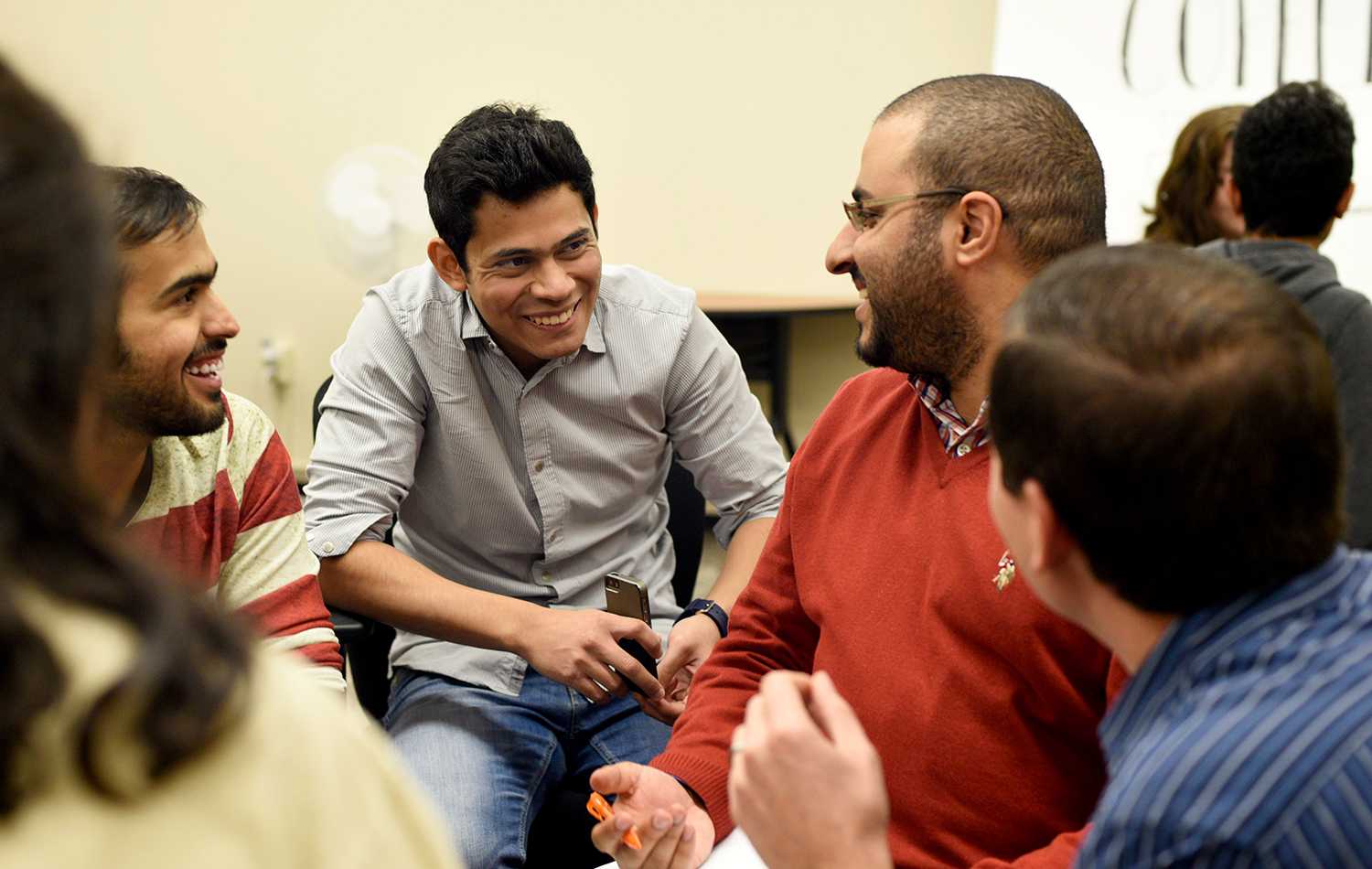With pizza boxes, paper plates and two-liter bottles of soda spread around, the meeting room on the third floor of Tate Page Hall was buzzing with conversation. Students from all backgrounds huddled in groups as they welcomed one another with a cheerful “Marḥaban,” the Arabic word for “hello.”
The Arabic Club was gathering for the second time this semester. As English and Arabic speakers came together for homework assistance, it became obvious that the Arabic program holds a significant place on WKU’s main campus — and that it is expanding.
In 2014, WKU became the first university in either Kentucky or Tennessee to offer a major or minor in the Arabic language. Since that time, the program has grown to over 50 students who have declared majors.
Arabic professor David DiMeo was the first Arabic instructor hired at WKU. For two years, he’s helped foster the program’s growth.
“When the program began, we were asked to project the number of anticipated majors for the fifth year of the program,” DiMeo said. “However, by the end of the program’s first year, we had tripled that projected number. We were thrilled.”
This continued growth prompted the application for a new $154,000 federal grant from the U.S. Department of Education for the 2016-2017 and 2017-2018 academic years. DiMeo said this grant almost guarantees growth.
“That money is going to give the program an opportunity to fully expand to its potential,” DiMeo said. “We plan to introduce three new classes, which will include Arabic in journalism, Arabic in business, and Arabic in international service. These new classes will allow us to hire new faculty members, which will, in turn, create new course openings for students placed on waiting lists.”
Lhosseine Guerwane is another Arabic instructor at WKU. He’s taught foreign language courses at both the high school and university level since he graduated from WKU in 2008.
Guerwane said he hopes the expansion will encourage all students to consider taking Arabic as a foreign language.
Guerwane said he hopes the expansion will encourage all students to consider taking Arabic as a foreign language.
“Students forget that there are other options,” Guerwane said. “Everyone immediately thinks of Spanish or French or German, but I want students to branch out and try an Arabic course. I have noticed that once a student takes an Arabic course, they seem to continue with the program. They begin to love the language.”
Medina, Saudi Arabia sophomore Mazen Bukhary came to WKU in fall 2015 to pursue a major in construction management. When he came to Kentucky, he was shocked by the Arabic language’s presence in a predominantly English-speaking area.
“I didn’t expect any Americans to speak Arabic, but I met some students on campus who spoke to me in my native language,” Bukhary said. “It’s so cool that WKU has this opportunity for the Arabic language, because it was definitely unexpected.”
In 2010, the U.S. government identified 13 critical languages that they determined necessary for global success. Arabic was included in the top tier of the language ranking. Those who speak both English and Arabic are becoming valuable to economic growth and international relations.
“Both the state government and the Potter College dean are hugely invested in the program because of Arabic’s importance,” DiMeo said. “But, we have realized that there are not many textbooks for the Arabic language in anything other than economics or government. We want to change that fact.”
Arabic’s designation as a critical language shows that WKU’s Arabic program is safe from recent budget cuts to Kentucky colleges and universities.
“Strategic languages are not grouped into the humanities, so our program has remained untouched,” said DiMeo.
Elizabethtown sophomore Noah Stevens, who has numerous family members in the military, aims to pursue a career in diplomacy. He decided to triple major in international affairs, Arabic and Middle Eastern studies to enhance his abilities while studying abroad. However, Stevens still feared the possibility of budget cuts.
“I think that the program is safe,” Stevens said. “I still worry, though. My entire career path is based on this language, so I would suffer if the program shrunk.”
Regardless, Arabic is beginning to cement an important place in WKU’s legacy. High schools and colleges around the region are looking to WKU’s program as a successful example.
“We are currently in contact with three high schools in Nashville,” DiMeo said. “The schools want to embrace the language and introduce programs of their own.”
The knowledge of foreign languages like Arabic is imperative to professional success, Guerwane said. Arabic majors, natives and instructors all try to highlight this importance.
“Most lessons are temporary,” said Guerwane. “Language is something that you keep with you. Its authenticity stays with you no matter where you go in life.”


